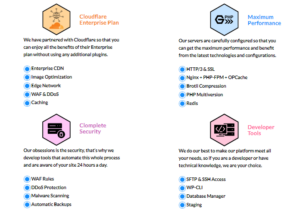Table of Contents
The choice of web hosting type depends on several factors, including the size and nature of your website, your performance needs, budget and level of technical expertise.
Shared:
In shared web hosting, multiple websites share the resources of a single physical server. This includes resources such as disk space, bandwidth, processing power and RAM. Each user has their own designated space on the server, but shares resources with other users hosted on the same server.
It is ideal for small websites with moderate resources. The limitation is that website performance can be affected by the activity of other websites hosted on the same server. If another site experiences a sudden spike in traffic, it could slow down your site’s performance.
VPS (Virtual Private Server):
This is a virtualized server that runs inside a larger physical server. Unlike shared hosting, where multiple sites share the resources of a single server, in a VPS each user has access to dedicated resources and a virtualized part of the server.
Because of the dedicated resources, websites hosted on a VPS tend to have better performance and greater stability compared to shared hosting.
VPS plans are usually scalable, meaning you can increase or decrease resources as needed to meet the demands of your website.
Dedicated Server:
A dedicated server is a type of hosting service in which a single physical server is dedicated exclusively to a single client or user. It is ideal for websites with very high traffic, custom applications or specific security requirements.
As the sole user of the server, you have full control over the server’s configuration, operating system, installed applications and other customizations. This allows you to tailor the server to your needs.
Cloud hosting:
A form of web hosting where the resources needed to maintain a website (such as storage, processing power and bandwidth) are distributed across multiple remote servers rather than relying on one physical server.
In many cases, cloud hosting is billed on a “pay-as-you-go” model, meaning you only pay for the resources you consume. This can make it more cost-effective than other forms of hosting, especially for websites with fluctuating traffic or resource requirements.
By distributing resources across multiple servers, cloud hosting offers greater availability and redundancy. If one server fails, traffic is automatically redirected to other servers in the cloud.
Managed hosting:
This is a web hosting option where the service provider manages and maintains all technical aspects of the server for you.
The hosting provider takes care of the initial server setup, software updates, security, regular backups and other technical aspects related to server management. This frees the customer from the responsibility of managing and maintaining the server and concentrating on the content and development of your website.
Managed hosting providers usually offer 24/7 expert technical support. You can get help with server-related problems, configuration queries and other technical issues through a variety of communication channels, such as live chat, email or phone.
Managed hosting providers typically monitor the server proactively to detect and resolve any performance or security issues. They also implement advanced security measures, such as firewalls, intrusion detection systems and malware protection.
WordPress Hosting:
Specially optimized for websites built with WordPress, providing specific performance and security features for this platform.
WordPress Hosting services are designed and optimized specifically to work with WordPress software. This includes optimized server configurations, support for WordPress plugins and themes, as well as specific tools to improve the performance and security of WordPress websites.
WordPress Hosting providers typically offer one-click WordPress installations, making it easy to set up a WordPress website in minutes.
WordPress Hosting servers are typically optimized to provide optimal performance for WordPress websites. This can include features such as page caching, integrated CDN (content delivery network), optimized database servers and scalable resources as needed.
WordPress Hosting providers often offer specialized technical support for WordPress users.
This includes assistance with WordPress-specific issues, configuration queries, plugin and theme recommendations, and guidance on best practices for managing a WordPress website.
WordPress Hosting services typically include advanced security measures to protect WordPress websites against online threats, such as firewalls, malware detection, automatic security updates, and regular backups.
Dedicated hosting for wordpress:
If you have a wordpress website, or you want to create it in wordpress this option is the right one for you, with https://cloupsy.com/ you can create your website and have an intuitive and easy administration panel.
The best thing is that it is managed, fast, easy and secure. Unlike other hosting, the technology, the price, the security is incredible.

You can purchase a monthly or annual plan, and you can scale as your resources increase.

Hosting Features: Everything You Need to Know
Before choosing a hosting provider, it is essential to explore the various features offered by the different services.
Disk Storage
The space available to store website files, such as web pages, images and databases, is essential. Consider the future growth of the website and its traffic when calculating storage. Limited space can negatively affect user experience and site functionality.
Bandwidth and Data Transfer
These terms, often used interchangeably, represent two different concepts. Bandwidth refers to the ability to transfer data to visitors simultaneously.
Data transfer is the actual amount of data used in the bandwidth.
FTP access
FTP access facilitates the transfer of website files, such as documents or images, so that users can download them. This service is essential for content management and site updating.
Safety and Security
Security measures are very important when choosing a hosting, such as: WAF rules, DDoS protection, malware scanning, automatic backups.
Technical Support
An efficient and accessible 24/7 technical support service is super important as technical issues can arise at any time, even outside of regular business hours.
Any downtime on a website can result in loss of visitors, sales and reputation.
These are some of the main features that web hosting services usually offer. Before making a decision, it is important to evaluate your specific needs and compare the available options to find the service that best suits your requirements.
When choosing a type of web hosting, consider your current and future needs, as well as your budget. It is important to research hosting providers to find the best option that suits your needs.






